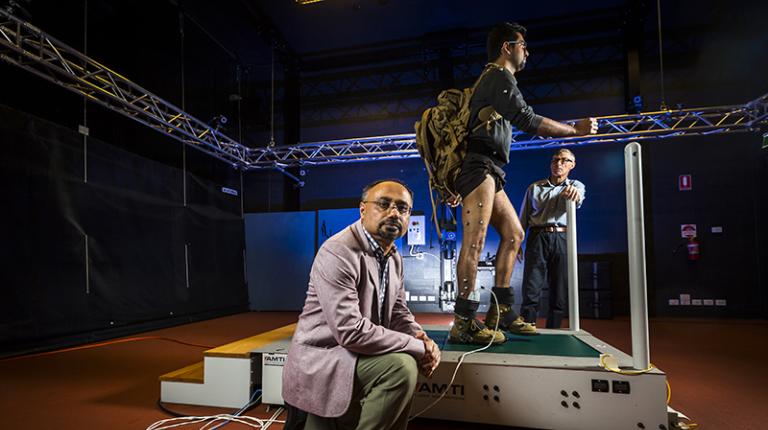VU researchers use high-tech solutions to help prevent fall injuries
Falls are a major health issue in the community with around 30% of adults over 65 experiencing at least one fall per year. Falls can result in older people limiting their activities, as well as a reduced quality of life and a loss of independence. Even falls that do not result in physical injuries can result in “post-fall syndrome” – a loss of confidence and increased hesitancy and tentativeness. It has been found that after falling, 48% of older people report a fear of falling and 25% report reducing their activities. Falls can also lead to disability and decreased mobility which often results in increased dependency on others and an increased probability of going into care.
Professor Rezaul Begg, from Victoria University’s Institute for Health and Sport, is one of 15 recipients to receive $2.8 million (shared equally among 15 funded projects) from the Victorian Government agency for innovation, veski, for his research into this growing problem in our ageing population.

Leading Biomechanics Capabilities
Professor Begg and postdoctoral research fellow Dr Hanatsu Nagano are partnering with the Japan-based exoskeleton manufacturer CYBERDYNE and Tsukuba University to bring exoskeleton-assisted movement rehabilitation to medical and research facilities across Australia, including to the new Footscray Hospital.
Professor Begg's research, which combines Victoria University's innovative 'smart' joint-controls with the world's first Hybrid Assistive Limb (HAL) exoskeleton developed in Japan, could reduce injuries due to falls but also help a wide range of patients, including those recovering from stroke. The project aims to tailor the exoskeleton to an individual patient's requirement, drawing on the University's expertise in machine learning and gait biomechanics.
“We are very excited and honoured our research has been recognised by veski and we look forward to collaborating with CYBERDYNE on work that has the potential to positively impact Greater Western Melbourne,” said Professor Begg.
Victoria University is one of only a few organisations worldwide to combine advanced biomechanics, robotics, computational intelligence and wearable sensors. CYBERDYNE developed the world's first Hybrid Assistive Limb (HAL) exoskeleton. Both organisations have world-class facilities including Victoria University's Biomechanics Laboratory.
Veski
veski was established to enhance Victoria's intellectual capital through a program of fellowships, awards, and international networks. veski is at the forefront of Australia’s innovation economy. Since its inception in 2004, veski has been instrumental in building Australia’s intellectual capital and innovation.
The grant supports international research collaborations with Victorian universities and TAFEs across research projects covering mining, advanced manufacturing, health and education.
“Global Victoria and Study Melbourne are proud to support Victorian researchers who are making a difference to their communities and the world – their innovation, ingenuity and collaboration in these projects is a reflection of Victoria’s world-class reputation for research excellence,” said Gönül Serbest, Chief Executive Officer of Global Victoria.